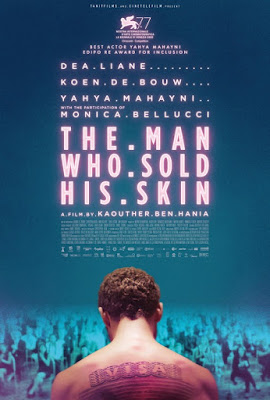The Man Who Sold His Skin (2020)
Director: Kaouther Ben Hania
Stars: Yahya Mahayni, Dea Liane, Koen De Bouw
Runtime: 104 minutes
Synopsis: His own body turned into a living work on art and promptly exhibited in a museum, Sam, a Syrian refugee, will soon realize to have sold away more than just his skin.
Verdict: When I randomly stumbled onto Tunisian filmmaker Kaouther Ben Hania’s "Beauty and the Beast" last year on Netflix, I was baffled. I became immediately convinced that I had found a director who would use her voice to illustrate the many human rights violations taking place in most countries in the MENA region to the entire world. Surely enough, her sophomore feature "The Man Who Sold His Skin" made its way to the Oscars where it will be competing in the Best International Feature category, a first for the North-African country and an achievement that instantly skyrocketed my interest in it.
There are undeniably many things to appreciate about the film, including Lebanese cinematographer Christopher Aoun’s impressive work handling the camera. While the acting had its ups and downs, it was for the most part solid and efficient in delivering the characters’ emotions to the viewers. It’s altogether a very competently crafted movie from a technical standpoint, a feat Ben Hania already proved in her equally striking debut.
But it’s in its narrative that "The Man Who Sold His Skin" lost me, which pains me to say due to the premise’s incredibly creative way of dealing with its themes. To highlight the desperation of Syrian refugees and their willingness to go to extreme lengths to escape the prison that is their homeland, Ben Hania opts for an intriguing plot that sees Sam, our protagonist, sell his back to a Belgian artist to use as the canvas of his next project: a living work of art. Out of Sam’s reach is painted the Visa he so desperately wants, his ticket to a better life in Europe where his ex-fiancée, now married to a different man, awaits him. Sam is quite literally turned into a commodity, a painting for the more privileged people to stare at in museums to later sell at auctions. The only crime he ever committed was being born in a country ruled by a dictator, and he knew that the price he had to pay to escape the hellhole he was trapped in was his soul, the very thing that made him a human being.
"The Man Who Sold His Skin" is perhaps the most important film nominated for an Oscar this year as it tackles a subject that is highly misconstrued and underrepresented in Western Cinema. No, Syrian refugees should not be looked at as a burden because most of them are only looking for a second chance at life, ready to do anything to guarantee a future that sees them and their families getting the most basic human rights. And because this film is such a vital watch that also intelligently questions the limits set by art, I was irritated to see it not reach its full potential. By being too focused on the details, it forgot to properly look at the bigger picture and expand on it organically. It was difficult for me to get invested in a narrative in which a good portion is dedicated to an uninteresting love triangle that adds next to nothing to the themes surrounding it instead of focusing on the incredibly heavy burdens that come with being a refugee. It all moves either too slowly or too fast and, once the ridiculously out-of-place ending takes place, I rolled my eyes in frustration instead of feeling the emotional weight of the topics addressed.
If you want to better understand why Syrian citizens are looking for a way out of their country, I strongly recommend watching Waad Al-Kateab’s brilliant documentary "For Sama". If you’re in the mood for a good satirical take on the current state of modern arts, Ruben Östlund’s award-winning film "The Square" works better, in my opinion. I was hoping that "The Man Who Sold His Skin" would provide an accurate look at the difficulties that come with being a refugee to separate itself from the aforementioned films, but it’s with big regret that I have to conclude by saying that it doesn’t quite hit all the right spots.
FINAL GRADE: 5/10

Comments
Post a Comment